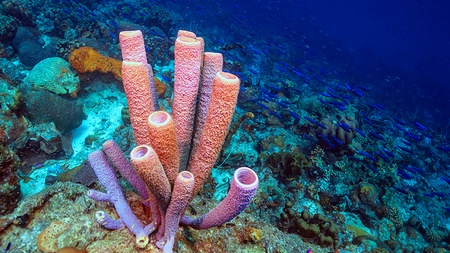Developing new, sustainable methods to protect fish, algae and sponges from diseases by harnessing the power of disease-suppressive marine microbes and the bioactive substances they produce, is the focus of a new project which brings together researchers and commercial partners from 10 European countries.
Bioactive substances have actions in the body that may promote good health. Researchers expect to find applications in the pharmaceutical, agriculture and aquaculture industries.
The University of Aberdeen is a partner in the EU Horizon 2020-funded MARBLES programme.
MARBLES is a £6.37 million (€7.5 million), 5-year project that will develop new methods for the sustainable collection and use of biological resources from marine environments and assess their commercial potential.
MARBLES aims to create eco-friendly solutions as viable alternatives to the synthetic chemicals currently used in pharmaceutical, agriculture and aquaculture settings.
In particular, the project will assess the potential of microorganisms derived from marine sponges, microalgae and fish for disease suppression, both the microorganisms themselves and their bioactive natural products will be assessed.
These disease-suppressive microorganisms will be obtained from "microbiomes", which are the complex collection of microorganisms that live in and around their marine hosts.
Among other benefits, these microbes and the natural products derived from them will help to increase the efficacy of fish production, therefore reducing the pressure on harvesting wild fish, and will help the transition of the agricultural crop sector towards bio-based and circular solutions.
The marine environment remains a largely untapped and poorly understood source of natural products with potential for application in the pharmaceutical and food industries.
Challenges include finding and identifying the bacteria and their molecules, extracting their active ingredients in a sustainable, effective way, and the commercial and regulatory difficulties of bringing a discovery from the lab to market.
In the context of an increasing global population and the current climate and biodiversity crises, there is an urgent need to sustainably harness new compounds with pharmaceutical and nutritional applications. These are the issues that MARBLES will address.
Professor Marcel Jaspars, who is leading the University of Aberdeen’s involvement, said: “We are excited to be a part of this talented multinational and multidisciplinary team of scientists.
“The Aberdeen team will be isolating and identifying compounds that might be useful in agriculture, aquaculture and medical applications.
“To find these substances we will be searching amongst bacteria that grow inside sponges and on the surface of seaweeds and fish. Aberdeen will also be providing input into the global ocean treaty that the UN is developing”
MARBLES project coordinator, Professor Gilles van Wezel from the University of Leiden (the Netherlands) said: “MARBLES will have a significant impact across European pharmaceutical and food industries. The project will unlock some of mother nature’s secrets, and harness marine biodiversity’s potential to address some of society’s greatest challenges. Our diverse team will ensure the project’s outcomes will have practical applications in a range of settings. I’m looking forward to sharing our developments!”
MARBLES partners will hold an inaugural project meeting from 7-8 October 2021 at Kasteel Oud Poelgeest (the Netherlands).
The project will run until April 2026.


